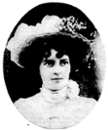Amy Hogue was born in Sydney on 29 April 1880, along with her twin brother, Oliver Hogue. She was the author of children’s novellas and short stories, publishing several Australian fairy stories and bush tales in her lifetime.
She was a “clever member of a clever family,” with Oliver Hogue being a renowned journalist and author, also writing under the name 'Trooper Bluegum'. Amy’s father, James Alexander Hogue, was a political journalist, editor of the Evening News, and member of the Legislative Assembly for Glebe amongst many other titles. These relationships suggest a privileged connection to the publishing industry for Hogue. She married Henry Latour Lomax at the Glebe Presbyterian Church on 19 March 1902, though she continued to use the last name Hogue in public settings.
She was also a popular elocutionist, using her talents to support her local community. To raise money for the Red Cross Fund, she once wrote a localised imitation of The Absent-minded Beggar that received a “showering of coins” at the Glebe Town Hall concert in 1914. She also aided the Belgian Fund in another Glebe Town Hall concert that same year. Hogue appeared in Miss Marie Narelle’s 1899 concert in the Masonic Hall, reciting “‘The Midnight Charge" and "Hanging the Picture" by Miss Katie Christie and Messrs. V. Collins, F. J. Fieldsend, and W. Shotton. The concert was reviewed as “an artistic and financial success.” Other appearances include Miss Maud Fitz-Stubbs’ concert at St. Matthias’ Hall in 1901 and a recital at the Royal Art Society’s concert in 1917.
In her early career, Hogue entered many literary newspaper competitions. She received a special mention for her entry into Class A of the Australian Town and Country Journal Prize Competitions in April 1896 and was on the Honour List for Class B in September 1896. In the same September issue, she was praised for being the sole competitor for Class C, although the paper withheld the award due to the lack of competition. In 1897, her poem, 'A Wreck at Sea', was published in the Little Laureate’s Competition.
Her writing career was not without criticism. Hogue submitted an additional chapter for her children’s novella Miss Baby to the Australian Town and Country Journal, but the journal replied, “It would have read somewhat like an after-thought. We suspect many of your young readers will find it hard to forgive you for killing the poor little child.”
In 1897, Hogue was caught in the drama surrounding Miss Daisy Benjamin, who was believed to have taken the name “Amy Hogue” as a pseudonym after being mistaken as a Miss Benjamin from Hobart in a literary competition. Daisy Bejamin had been credited with writing Miss Baby and Poss Wester’s Heroism in the announcement of the amendment, though these were the works of Amy Hogue. Columnist Dame Durdin then set the record straight and said that Hogue would, in her belief, “some day be heard of widely as an authoress.”
Hogue knew how to stand up for herself, writing to the Daily Telegraph in 1913 to claim the record of being “the first woman to attend public banquets on Ministerial journeys and speak on those occasions,” in response to an earlier interview with politician’s wife, Mrs Arthur Griffith, who had made the same claim. Hogue asserted that when she “toured the North Coast three or four years ago” with her father, she was requested to “respond to a toast of “The Ladies”,” at a banquet in Bungwahl.
Amy Hogue died at “The Vale,” Rouchel, on 4 July 1918. She had contracted pneumonia some years before and since suffered from an affection of the heart. Hogue had been visiting her sister when she contracted a chill, which seriously worsened her health, and she died suddenly at 38 years old.
This biography was researched and written by Stephanie Goltz.
Sources:
“District News Letters. Rouchel.” Maitland Daily Mercury, 10 July, 1918. https://trove.nla.gov.au/newspaper/article/123430086.
“Glebe Concert Belgian Fund.” Sydney Morning Herald, 7 October, 1914. https://trove.nla.gov.au/newspaper/article/15556300.
“Glebe’s Tribute.” Sunday Times, 13 September, 1914. https://trove.nla.gov.au/newspaper/article/126759007.
“Hogue-Lomax Marriage.” Moree Examiner, 1 April, 1902. https://trove.nla.gov.au/newspaper/article/111785555.
“Journalists at Art Show.” Evening News, 5 October, 1917. https://trove.nla.gov.au/newspaper/article/121246920.
“Miss Maud Fitz-Stubb’s Concert.” Sydney Morning Herald, 22 June, 1901. https://trove.nla.gov.au/newspaper/article/14392665.
“Miss Narelle’s Concert.” Newcastle Morning Herald and Miners’ Advocate, 17 October, 1899. https://trove.nla.gov.au/newspaper/article/135378905.
“Miss Narelle’s Concert.” Sydney Morning Herald, 18 October, 1899. https://trove.nla.gov.au/newspaper/article/14238670.
Mitchell, Elyne. “'Hogue, Oliver (1880–1919).” In Australian Dictionary of Biography, vol. 9, edited by Bede Nairn and Geoffrey Serle. Melbourne University Press, 1983. https://adb.anu.edu.au/biography/hogue-oliver-6700.
“Obituary. Miss Amy Hogue.” Scone Advocate, 5 July, 1918. https://trove.nla.gov.au/newspaper/article/156912293.
“Our Contributors. Trooper Bluegum.” Kia Ora Coo-ee, 15 May, 1918. https://nla.gov.au/nla.obj-8335329/view?sectionId=nla.obj-67215757&partId=nla.obj-8337205.
“Results of the Prize Competitions.” Australian Town and Country Journal, 11 April, 1896. https://trove.nla.gov.au/newspaper/article/71244353.
“Results of the Prize Competitions.” Australian Town and Country Journal, 5 September, 1896. https://trove.nla.gov.au/newspaper/article/71297992.
Rutledge, Martha. “Hogue, James Alexander (1846-1920).” In Australian Dictionary of Biography, vol. 9, edited by Bede Nairn and Geoffrey Serle. Melbourne University Press, 1983. https://adb.anu.edu.au/biography/hogue-james-alexander-6699.
 1268993624360128377.png
1268993624360128377.png
